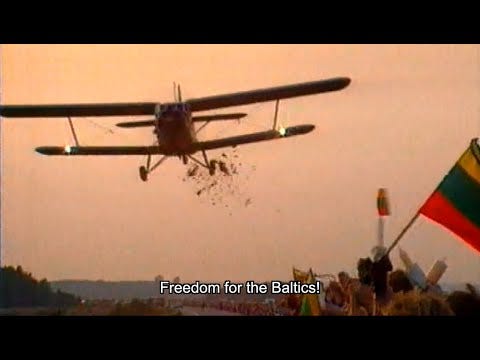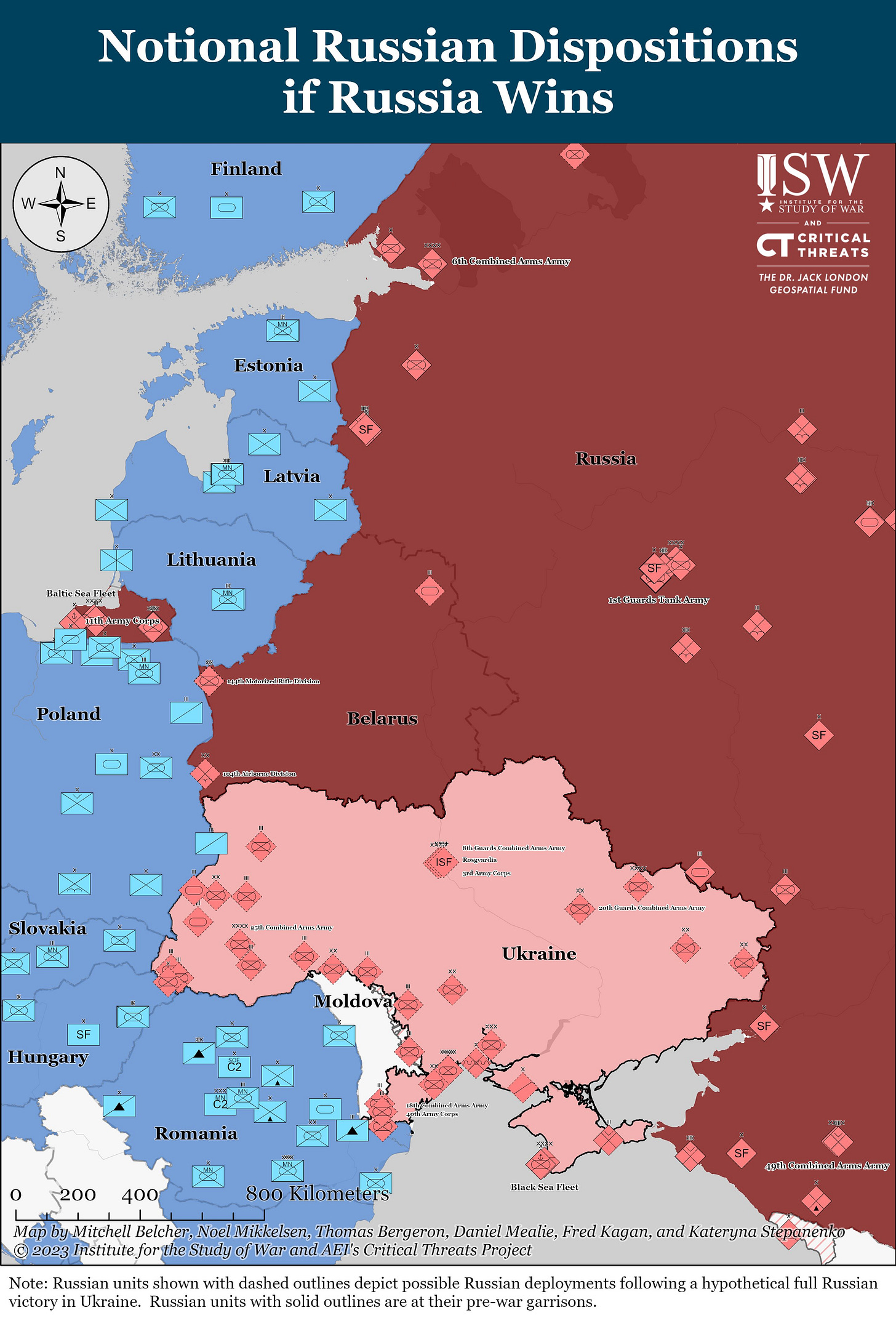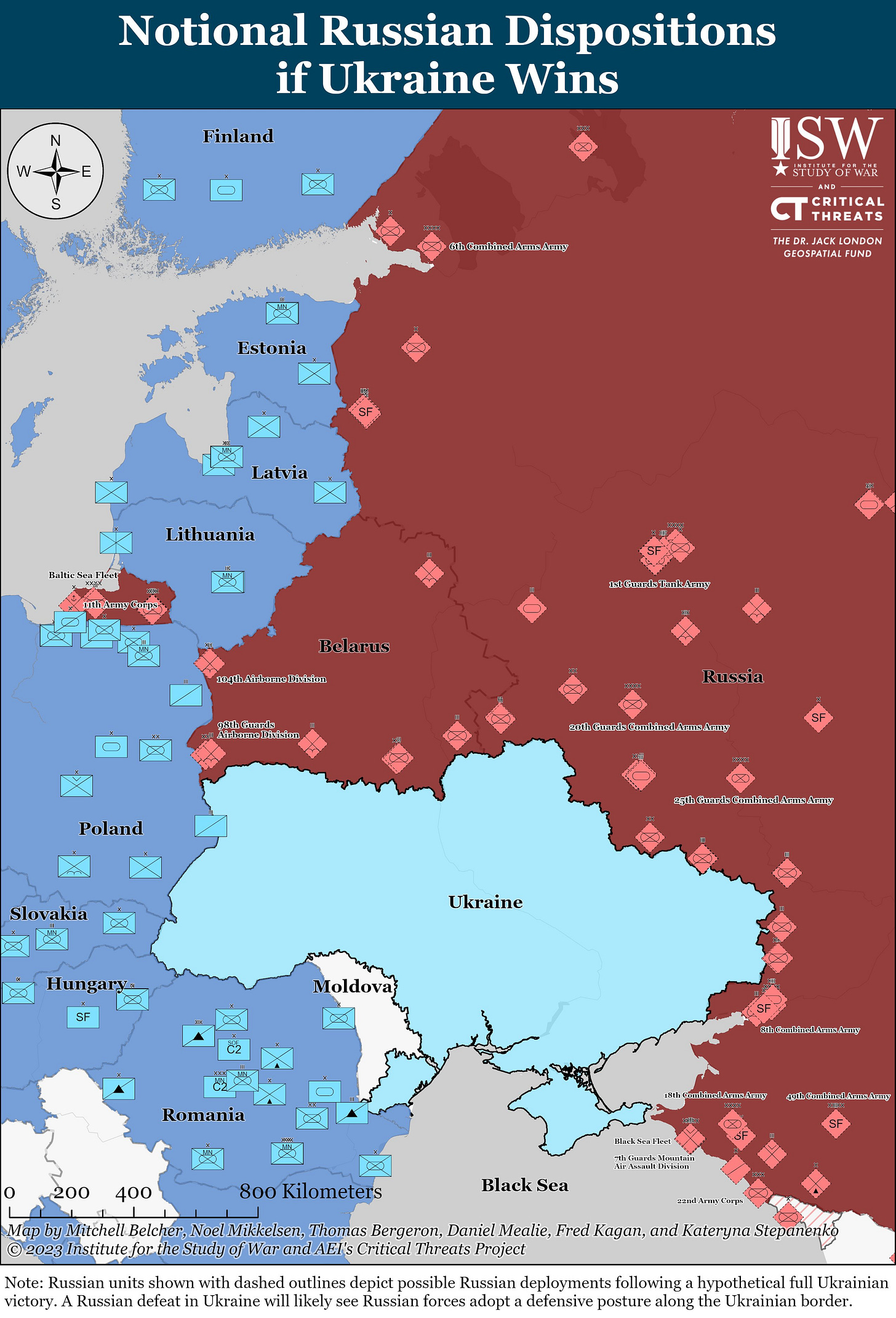What kind of world do you want to live in?
Most people are running around now thinking of the up-coming holidays, finishing up projects or meeting deadlines, caring for their friends and family, and just trying to keep their heads above water. They’re not thinking of the importance of continuing our support for Ukraine so that it can defeat the Russian forces and regain its territory in the southeast, northeast and the Crimean peninsula under Russian occupation. This all seems quite distant and detached from our personal realities.
The media on TV, the radio and online have been focusing on the costs of the war to domestic publics, and pondering the issue of ‘negotiations’, since in their view, as non-military and non-geopolitical experts, one campaign seems to make a war. It’s a short-sighted take that puts the emphasis on the now, and not on the consequences. The consequences are what matter.
My question to everyone is inspired by an interview with Fiona Hill in Politico. She posed a very simple question, that I’m putting here for your consideration to clear up the cobb webs and cut through the fog of war:
What kind of a world do we want to live in?
Is that a world where disputes are decided by one country invading and destroying another for its own thirst for power? Is it one where terrorism is the norm, and is allowed to kill innocent people and blackmail an entire nation? Is it a place where your life can get hacked by foreign intelligence services, thereby putting your work and personal security at risk? Is it a world where a country can deprive a whole continent of food, thus increasing the number of people that die of hunger? Is it a place where your kids and everyone else’s across a whole country can’t go to school for the 4th time in a row because the principals have received bomb threats? Or is it a world where foreign cyber penetrations can access our technology, steal our innovations and work, and play havoc with our infrastructure, increasing costs to our industries and to us?
Is this the world you want to live in?
Because that’s the world we’re going to get if we decide to step back and let Russia, China, Iran and their client states run the show.
The considerations in the next section by the Institute of the Study of War focus on consequences to U.S. and NATO security should the Russian forces be allowed to parition Ukraine. That means us: all of us. Besides these considerations, there are economic consequences that will affect our budgets if we are called to defend our territories. If you think the paltry sums we are now allocating to Ukraine for its defence is too much, wake up: we’ll be forced to begin pouring upwards of 25% of our budgets for defence.
Russia may not attack Poland or the Baltics straight-away should they succeed in Ukraine: they would most likely take the rest of Moldova and parts of Georgia that are essential to consolidating Russia’s military forward presence. This means free reign in the northern Black Sea for the Russian forces, missiles and drones within reach of NATO countries, and the increase of illegal trafficking of raw materials, drugs, humans, human organs, and anything else they need to fund their war effort.
What would a triumphant Russia mean for the standing of our values and leadership across the world? If our leaders fail now, they will be discredited, and that means more to world leaders than most other considerations. It speaks to the concept of trust. It means other countries that depend on the collective defence of NATO will have no confidence in that institution’s capabilities to defend against the onslaught of a Russian attack. Or China’s for that matter. They may turn to those very powers attacking them to find an accomodation, or worse, join their ranks.
Most people never think that values are important in international affairs. I’ve heard time and again that they’re ALL corrupt, and have no values. They’re all the same. That’s actually not true. Russian proxies and information vectors can get away with pushing this theme amongst our publics because most of us have not lived under a totalitarian regime, and Russian information operations take advantage of the very issues that seem to divide us.
Thankfully, leaders who have fought tooth and nail to free themselves of Soviet oppression and violence have left us their testimonies and experiences. Vytautas Landsbergis stepped up in Lithuania with his countrymen as well as with the peoples of Estonia and Latvia to form the Baltic Way—a human chain of two million people in the summer of 1989 that stretched for over 600 kilometres. It was also called the “Singing Revolution”. They wanted freedom to live, to prosper, to speak, to decide their own futures. By the way, Lithuania was the first Baltic state to declare independence in 1991: Iceland was the first nation to recognise a free Lithuania. Gabrielius Landsbergis, Vytautas’s grandson, is now the foreign minister of Lithuania, and continues to fight for these values.
This is what president Zelensky was talking about when he reminded the students, authorities, and servicemen and women at the U.S. College of Defence of the fundamental value we all hold dear: freedom. The Russians and their allies use the word ‘freedom’ to mean “freedom from the West”, from democracy, from our way of life. That’s what they would take away and have taken away.
You may think all this is but a distant possibility: ask the Ukrainians who are still alive in Mariupol whether they are free. Oh…you can’t. Most of them are buried under buildings that have been destroyed by the Russian armed forces. Those who are still alive can’t communicate with free Ukraine or the West unless they put their lives at risk. They’re also too busy fighting to survive, lining up for food.
I’ll leave you to the practical military considerations below. When the so-called pundits and influencers are bloviating in the media, vying for an end to aid for Ukraine, let’s focus on what really counts. The consequences of our moral and material surrender would bring us dangerously closer to a world we would not want to live in.
ISW: What’s at stake for the U.S. if Ukraine falls?
The US has a much higher stake in Russia's war on Ukraine than most people think.
As Americans consider the costs of continuing to help Ukraine fight the Russians in the coming years, they deserve a careful consideration of the costs of allowing Russia to win.
A Russian conquest of all of Ukraine is by no means impossible if the United States cuts off all military assistance and Europe follows suit. Such an outcome would bring a battered but triumphant Russian army right up to NATO’s border from the Black Sea to the Arctic Ocean.
If Russia wins, a victorious Russian army at the end of this war will be combat experienced and considerably larger than the pre-2022 Russian land forces.
A hypothetical Russian victory would allow the Russian economy to gradually recover as sanctions inevitably erode and Moscow develops ways to circumvent or mitigate those that remain.
A victorious Russia would over time replace its equipment and rebuild its coherence, drawing on a wealth of hard-won experience fighting mechanized warfare.
If Russia wins in Ukraine, it will bring with it advanced air defense systems that only American stealth aircraft—badly needed to deter and confront China—can reliably penetrate.
Russian victory in Ukraine would allow Russia to pose a major conventional military threat to NATO for the first time since the 1990s in a timeframe set to a considerable extent by how much the Kremlin invests in its military.
To deter and defend against a renewed Russian threat following a full Russian victory in Ukraine the US would have to deploy to Eastern Europe a sizable portion of its ground forces.
The US would have to station in Europe a large number of stealth aircraft, likely forcing the US to make a terrible choice between keeping enough in Asia to defend Taiwan and its other Asian allies and deterring or defeating a Russian attack on NATO.
The entire undertaking would cost a fortune, and the cost would last as long as the Russian threat continues—potentially indefinitely. Almost any other outcome of the Ukraine war is preferable to this one.
Helping Ukraine keep the lines where they are through continuous Western military support is far more advantageous and cheaper for the US than allowing Ukraine to lose.
“Freezing” the conflict is worse than continuing to help Ukraine fight—that would simply give Russia time and space to prepare for a renewed war to conquer Ukraine and confront NATO.
Helping Ukraine regain control of all or most of its territory would be much more advantageous, as it would drive Russian forces even further to the east.
Best of all, supporting Ukraine to its victory and then helping it rebuild would put the largest and most combat-effective military on the European continent at the forefront of the defense of NATO—whether Ukraine does or does not ultimately join the alliance.
ISW has today published a new report and accompanying maps that illustrate four military situations related to this war and its outcomes and consider their military-strategic and financial implications for the US.
Read it here: Institute for the Study of War.
We have considered elsewhere the important question of possible Russian escalations in the face of defeat and we do not minimize those considerations.
We have argued strongly that American values align with American interests in Ukraine and that there is a strong and cogent values-based argument for helping Ukraine liberate all its land and its people. We still believe that that is true.
But the American people are being asked to spend a lot of money helping Ukraine fight Russia, and it is not unreasonable for them also wonder what the financial cost of not helping Ukraine would be.
This essay is meant solely to serve as a departure point for a data-driven and realistic discussion answering that question.







I understand why you are sounding the alarm in so many posts. Unfortunately, you’re also preaching to the choir 🙁
The alarm is a starting point for us, a motivation to get going... and do something different. Because whatever we did until now clearly doesn’t work
In this sense, I suggest future thoughts should focus not on repeating the dangers of a Western retreat, but
1. Who could this “we” be which I so carelessly used just now
2. What is the position “they” (the Western majority not sharing your and my concern) can have that obviously a) makes sense to them and b) leads to the (non)reaction we observe
To begin:
A. Clearly, there is no sense of danger in (most of) the West. On the surface of it, that’s plausible: we have heard “wolf” cried so many times, and there are so many “wolves” cried our right now, and at the same time, all has worked out just fine in the end for some generations now.
What is really new today? Or were we just as irresponsible in the past and got lucky so far?
Oh, and the initial answer MUST be much shorter than a typical Claire post of 15 pages 😉. Because there must be a comprehensible underlying cause, and that has to be named, before we can indulge in learned essays about the history of ideas
My take: it’s the economy, stupid. The categorical difference between Western and pre-Western economies has eroded, both by us losing the edge and them learning to imitate us. And now, while we are still richer, they have come within the range where they can compensate material with effort
B. The moral high ground is lost. The only groups who can expect unquestioned credit as to their motives and honesty are in the business of defending the environment and/or disadvantaged groups.
I wonder whether the way forward is to recruit Greta Thunberg to the cause of maintaining liberal democracy, or to induce the captains of industry into politics (instead of superficially surrendering to the woke agenda)
I would wish for a Mont Pelerin Society 2.0 to rise up, but frankly, that was already a miracle -- reviving and modernising a past ideology -- the first time around. And it took decades; we may not have decades
Hence, my take is, we must oppose democracy (as in rule of the crowd) and promote the rule of the experts
Socrates drank poison for this...